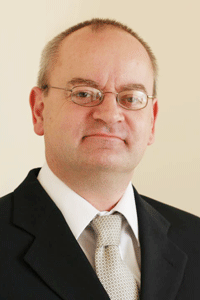USC names researcher as chair of new SmartState™ Program on environmental nanoscience and risk assessment
September 28, 2012

Dr. Jamie Lead has been selected
to be the Chair of the Environmental
Nanoscience and Risk Assessment
Center of Economic Excellence.
Dr. Jamie Lead, one of the world’s top nanoscience researchers, has been named Chair of the Environmental Nanoscience and Risk Assessment Center of Economic Excellence at the University of South Carolina.
The center, a collaboration between USC’s Arnold School of Public Health and NanoCenter, is part of the SmartState™ Program, established by the S.C. General Assembly with funds from the South Carolina Education Lottery. SmartState comprises the state’s three research universities – USC, the Medical University of South Carolina and Clemson University. Each SmartState Program matches state monies with private donations to create Centers of Economic Excellence in research areas that will advance South Carolina’s economy.
Lead is a fellow of the Royal Society of Chemistry, the Institute of Nanotechnology and the International Union of Pure and Applied Chemistry. Prior to joining the faculty in the Arnold School’s Deepartment of Environmental Health Sciences, Lead was a professor at the University of Birmingham in England, where he was director of the Facility for Environmental Nanoparticle Analysis and Characterisation (FENAC). His research focuses on understanding nanoscale phenomena in the environment, including natural nanomaterials, manufactured nanomaterials and their interactions.
Dr. Tom Chandler, Dean of USC’s Arnold School, said Lead will enhance the university’s strong program in nanoscience and expand research opportunities with prominent international scientists.
“We are pleased that Dr. Jamie Lead will direct the Environmental Nanoscience and Risk Assessment Center of Economic Excellence. His remarkable research record and collaborations with environmental and nanoscience researchers throughout Europe will enable us to expand the important work that is being done here and abroad in this growing field of science,” Chandler said.
Dr. Tom Vogt, USC’s associate vice president for research and NanoCenter director, said the study of nanoparticles raises many important questions.
“Nanoparticles have always been part of our environment. However, many new commercial and medical applications use nanoparticles, and this raises questions about the potential impact on the health of people and the environment,” he said. “Having Dr. Lead as the endowed chair of this Center of Economic Excellence will enable USC to be at the forefront of efforts to understand the complicated questions of fate and risk arising from the increased use of nanoparticles.”
USC’s “excellence in nanoscience and environmental science” drew Lead to South Carolina. “We have the opportunity to increase research in these two areas,” he said. “I also want us to further expand our research globally, and will use the contacts that I have through my teaching and research in the UK and Europe to link to the excellent science at USC.”
Lead’s appointment comes as high-tech businesses and medicine are increasing their use of nanotechnology, which is expected to have a $1.5 trillion global market by 2015. Research and development efforts by government and private industries are more than $3 billion annually.
While nanotechnology has numerous benefits, the potential risks associated with the use of nanomaterials for human and environmental health are not fully understood, said Lead.
“We want to know what the impact will be so that we can minimize the risks and make full use of the many benefits of nanotechnology,” he said. “My long-term goal is to have a sustainable industry.”
At the University of Birmingham, Lead was head of a research group with over 20 post-doctoral fellows and graduate students. He said that he wants to develop a similar research group at USC and draw on the expertise of the international cadre of scientists who worked with him in the United Kingdom. Lead also was a course leader in the master’s degree program in Human and Environmental Impacts of Nanoscience and Nanotechnology at the University of Birmingham in addition to Director of FENAC.
Lead earned a doctoral degree from Lancaster University, United Kingdom, and conducted postdoctoral studies in aquatic chemistry in the United Kingdom, Switzerland and Australia. He joined the University of Birmingham as a lecturer in 2000 and moved up the academic ranks to be named a Professor of Environmental Nanoscience in 2008. He served on several committees and advisory boards in the U.K., elsewhere in Europe and the United States, and is editor of the journal Environmental Chemistry. Between 2006- 07, Lead was a visiting scientist at the Commonwealth Scientific and Industrial Research Organisation, which is Australia’s national science agency and one of the largest and most diverse research agencies in the world.
His research has been supported by many funding sources including the European Union, the U.S. Environmental Protection Agency, the National Environment Research Council, Engineering and Physical Sciences Research Council, and the Department for Environment, Food and Rural Affairs in the United Kingdom.



_01.jpg)
_02.jpg)